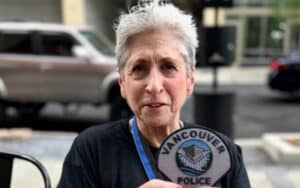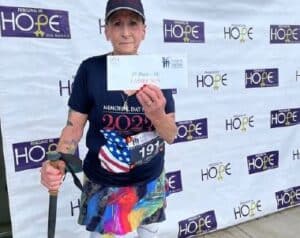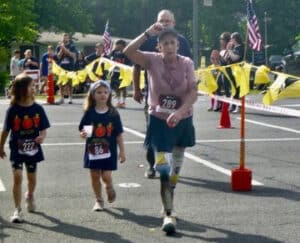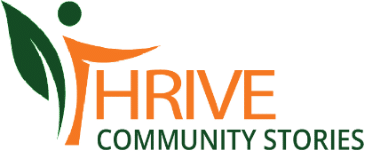Relaunching the Lead Advocate Certification Training
By Ryan Geddie, Government Relations Specialist
Photos of Paula Gollladay
 From the workplace to the halls of Congress, the Amputee Coalition believes all advocacy matters. However, we know from experience that different types of advocacy require different skill sets and knowledge. Our Lead Advocate Certification Training Program is an opportunity for limb loss and limb difference community advocates to develop the skills they need to be effective agents of change.
From the workplace to the halls of Congress, the Amputee Coalition believes all advocacy matters. However, we know from experience that different types of advocacy require different skill sets and knowledge. Our Lead Advocate Certification Training Program is an opportunity for limb loss and limb difference community advocates to develop the skills they need to be effective agents of change.
I asked Paula Golladay, a certified lead advocate for the Amputee Coalition, to tell me about a memorable piece of advocacy she has been involved in since becoming a lead advocate. She shared that, in addition to having the opportunity to advocate directly to members of Congress and their staffs last April as part of an Amputee Coalition event, she had the chance to deliver a presentation titled “Through My Eyes,” for the Patient and Family Advisory Council for Quality and Safety at Medstar Georgetown University Hospital.
 Paula shared her thoughts on the state of accessibility and disability inclusion at the hospital and, because of her training and personal experience as a member of the limb loss and limb difference community, she was able to effectively elevate the concerns of the community in the eyes of the advisory council. Paula’s experience is a great example of how training, combined with passion and personal experience, can create extraordinary opportunities for advocacy and institutional change.
Paula shared her thoughts on the state of accessibility and disability inclusion at the hospital and, because of her training and personal experience as a member of the limb loss and limb difference community, she was able to effectively elevate the concerns of the community in the eyes of the advisory council. Paula’s experience is a great example of how training, combined with passion and personal experience, can create extraordinary opportunities for advocacy and institutional change.
It’s because of experiences like Paula’s that we’re excited to be relaunching our Lead Advocate Certification Training Program on March 4. Just as with the former certified lead advocate training, you’ll be receiving invaluable lessons in how to be an effective advocate, especially at the institutional level. Through this revamped training, you will be equipped with the skills and experience to operate as an advocate for the limb loss and limb difference community as an individual and as a leader within your own community.
One aspect of effective advocacy that we would like to emphasize more in our Lead Advocate Certification Training is campaign organization. We know the path to change, even at the local level, can be daunting. We believe we can demystify this by breaking down the process of campaign and community organization into clearly defined and easy-to-understand steps. If you’ve ever wondered how to take an advocacy campaign from idea to action, this will be the training for you.
 Another important aspect of institutional advocacy that intimidates many advocates is the prospect of meeting with elected officials. We want to give you the tools you need, not just to schedule one meeting but to build relationships with elected officials and their staff members like a seasoned D.C. operative.
Another important aspect of institutional advocacy that intimidates many advocates is the prospect of meeting with elected officials. We want to give you the tools you need, not just to schedule one meeting but to build relationships with elected officials and their staff members like a seasoned D.C. operative.
At the end of our conversation, Paula shared with me that she believes “we have a long way to walk before our voices are truly incorporated into decisions.” I believe advocacy is one of the best and most effective tools our community has to ensure that the voices of the limb loss and limb difference community are heard. Trained advocates like Paula Golladay are the backbone of this effort. Come March 4, I sincerely hope you’ll join us for our Lead Advocate Certification Training.

